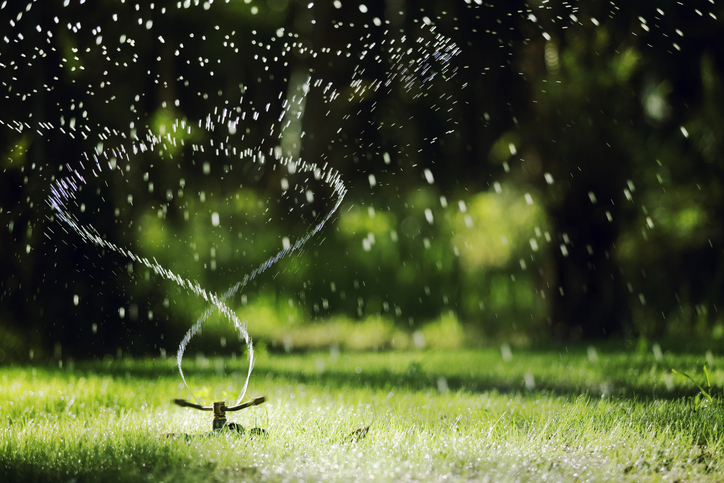
Proper watering nourishes lawns, just as proper hydration nourishes our bodies. Yet too many of us are failing at both. We’re not going to lecture you about drinking more water—we’ll leave that to your doctor or significant other. But we are going to give you a lesson about correctly watering your lawn.
Here are five lawn-watering mistakes that you’re likely making right now and ways you can fix those mistakes.
1. You’re over-watering your lawn.
Many homeowners drench their lawns with water. However, that’s not a wise move. Over-watering can leave your lawn susceptible to fungus and other diseases. It also can cause your lawn to grow too quickly and can wash away costly fertilizers, according to PlantCareToday.com. In addition, drowning your lawn wastes water.
To avoid excessive watering, PlantCareToday.com recommends buying a soil moisture meter. “These meters are very simple and valuable tools that you can pick up for $10 or so at any garden center or home store,” the website says.
Lawn care experts say most lawns need one inch of water per week. However, that’s merely a rule of (green) thumb, as watering requirements vary according to grass type, climate and seasonal changes.
“The amount of water required for an established lawn will be determined by its overall health, beauty, and ability to withstand use and drought,” says Turfgrass Producers International, a trade group for sod growers.
Related: Spring Lawn Care Tips You Can Do Now
2. You’re under-watering your new lawn.
While your existing lawn may be getting too much water, your newly planted lawn may not be getting enough. Bayer Advanced, a maker of lawn and garden chemicals, says a new lawn is in a “critical stage” during its first year.
“Don’t rely solely on rainfall to establish a healthy, deep root system—provide supplemental irrigation during the first year of growth,” Bayer Advanced suggests.
How much irrigation you do depends on factors such as the type of grass and the climate.
3. You’re not monitoring your irrigation system.
If you’ve set up an automatically timed irrigation system to water your lawn, don’t put it on autopilot.
“Irrigation timers are not ‘set it and forget it’ devices,” says Lee Miller, a turf pathologist at University of Missouri Extension. “You’re not cooking turkey for Thanksgiving dinner. Sprinklers should be adjusted according to precipitation events.”
For instance, if it’s been steadily raining the past two days, your sprinkler system should be off for a while afterward. The San Diego County Water Authority recommends turning off the sprinklers for two weeks after “significant rainfall.”
“After a storm, do not begin watering again until the top 1 to 2 inches of soil are dry. Lawns that lose their lush green luster will rejuvenate with the next rain,” says Jeff Stephenson, principal water resources specialist at the San Diego Water Authority.
Researchers at Kansas State University found that 65 - 83 percent of homeowners surveyed in three Kansas cities didn’t know how much water their lawn irrigation systems had applied.
“In reality, deep and infrequent irrigation makes for deeper root systems,” UM’s Miller says.
4. You’re watering your lawn at the wrong time.
The worst time to water your lawn is when you’re probably sound asleep. Watering after dark soaks the lawn overnight; a soggy lawn invites fungus and other diseases to invade your grass.
When’s the best time to water your lawn? Experts says it’s around 4-8 a.m., before many of us have sipped our first cup of coffee.
Watering the lawn early in the morning gives it a good supply of water to survive the heat of the day, according to University of Illinois Extension. Early morning also tends to be when wind speeds are lower and, therefore, when water evaporation is less likely to occur.
5. You’re assuming that you’ve got to water brown grass.
When your lawn is brown, you might think it’s parched. However, it may simply have gone dormant during hot weather or drought conditions.
“Dormancy is simply a state of reduced water usage where the turfgrass ... focuses resources on the roots,” the Lawn Institute says. “Dormant turfgrass will turn brown and is often considered unsightly, but it will recover when conditions improve.”
In other words, brown grass doesn’t necessarily equal dying grass.
The institute says summer dormancy is a normal response to heat and drought, and most lawns can stay dormant for at least three to four weeks without dying.
During the summer, “the worst that will happen if lawns are not watered is that weaker parts of the lawn or areas in hot spots will die,” according to the Oregon State University Extension Service. “When fall returns, lawns can be reseeded and will recover just fine over the winter.”
John Egan is editor in chief at LawnStarter, which offers an online platform and mobile app to connect homeowners with lawn care providers.








made notes of the information for reviewing at home.
Good Information on lawn care.1st class cite
Just when I think I have it figured out. Thanks again for the information.
This article was great! Just what i needed
This is definitely a good article
Great Post. really appreciate this information, very helpful. Thank you for sharing!
Great tips! Over watering can lead to more damage than people realize!
Thank you for the tips! This is extremely helpful! One of my clients had always water his lawn at night thinking the water can really soaked well at night. Exactly like you said, he started to get fungus in his lawn.
Thanks for telling me that overwatering can cause our lawn to develop some fungus and other diseases. I noticed that my mother frequently waters our lawn and I thought it wouldn’t benefit the plants and the grasses that we have. It might be better to have our old sprinkler repaired and just let it do the job every morning.
Awesome post! Glad to see this information, it’s very useful one.